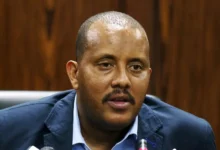
Britain’s former Foreign Secretary and the Mayor of London Mr Boris Johnson has been elected as the country’s next Prime Minister following his successful election as the leader of the Conservative Party.
He has resumed office last Wednesday, as the 76th Prime Minister of the country, succeeding Theresa May who announced her resignation on the 7th of last month. He expectedly and comfortably beat his rival, the current Foreign Secretary, Jeremy Hunt by 92,153 votes to 46,656 representing 66.4 percent. The two were among ten other contenders of the high office of Britain.
Britain has experienced severe political turmoil ever since the citizenry decided in a referendum to leave the Europen Union some two years ago.
The then Prime Minister, David Cameron resigned over the the decision by the citizens. He did foresee the huge task ahead of the UK as being a leading member of the EU and the possibility of her country easily leaving the union they have played a leading role for 46 years. He therefore resigned after six years as the Prime Minister of Britain, amidst the uncertainties of the outcome of the unprecedented national decision on the infamous Brexit.
Theresa May then took over and did all she could but circumstances were such that she was unsuccessful as she was unable to deleiver the major target of her government to enable the country leave the EU.
She decided to step down after a revolt by Conservative Members of Parliament over her unpopular Brexit policy. As it stands, Britain has up to the 31st of October, this year to deliver Brexit.
Mr Johnson made the ceremonial drive from the Buckingham Palace where he called on the Queen of the country to asked permission to form a government as per the tradition of Britain. Upon his arrival at the Number 10 Downing Street (the seat of government) to start work, the heavy presence of the media told it all, the task ahead of him.
Boris Johnson is known for the great controversy surrounding his political career. His position now as the Prime Minister, is hailed just by his supporters. Within the House of Commons, he is not that popular, as he has no majority. He is also faced with the issue most British Prime Ministers face, which is wielding the mandate of the general public as he is only approved by the members of the Conservative and upon his assumption of office, more than half of Theresa May’s members of cabinet, including leadership rival Jeremy Hunt, quit or were sacked.
As the new Prime Minister, he also faces huge task of uniting the nation which is sharply divided chiefly due to the Brexit drive. As per his promise, he is also expected to clinch a deal for his people or leave the EU without a deal on or before the 31st of October this year as withdrawal is definitely ruled out. Plans for leaving the UK must go ahead but from a different perspective and strategy because “if there is no-deal, the UK will have its £39bn”
This is because Brexit has taken a heavy toll of the political and economical day-to-day endeavours of the members of the EU and their citizenship. The President of France Emmanuel Macron, for instance, puts this in a very sarcastic way saying, “We will not want Brexit to pollute the EU”
The huge question Mrs May left unanswered is how to manage the deadlock over how, when or whether to leave the EU or not. This obviously is now a daunting task for Mr Johnson who will have to work hard and very diplomatically among the two divides of parliament to find a consensus on Brexit which has become a huge political crisis and an obvious extremely difficult task to work on.
Mr Johnson has to work hard to break the impasse characterise Brexit but he is also someone who is known to feel comfortable with a no deal feat for the people of Britain.
For instance, he quitted Mrs May’s government, criticising her former boss of ineffective approach to clinch a deal and then change his hitherto view of deal to no deal and now that he is the Prime Minister, all guesses may be only one and that is no deal is fine.
For now, it appears from all indications that Mir Johnson this time round aims at delving Brexit at all cost.
In his maiden speech, Mir Johnson made a pledge that the UK will leave the EU on the stipulated date of 31 October, at all cost and indicated that “a no-deal Brexit will happen if an agreement cannot be reached by then.”
Formation of his government has therefore been interesting as it is of much interest to the nation and the rest the world especially Europe, in relations to the Brexit albatross. To this end he has many cabinet members who originally voted to remain in the 2016 EU referendum with leading “Brexiteers” such as Priti Patel and Dominic Raab being provided with top positions of Home Secretary and Foreign Secretary respectively apparently to help facilitate the course.
Outside the United Kingdom, Mr Johnson appears so unpopular especially among the ethnic minority groupings living in the country for his derogatory comments about them and his glaring hatred and racism exhibited in an instance called commonwealth citizens “piccaninnies” he has also described Muslim women wearing burkas as “lookalike letter boxes
He is someone who has over the years reported to have defended the detested history of colonialism and wished its continuity would have been the best for the people of Africa. He once said “The best fate for Africa would be if the old colonial powers, or their citizens, scrambled once again in her direction; on the understanding that this time they will not be asked to feel guilty.’‘
His comments ‘‘The best fate for Africa would be if the old colonial powers, or their citizens, scrambled once again in her direction; on the understanding that this time they will not be asked to feel guilty.’‘ was received wide global condemnation.
There is a school of thought whose view is that Mir Johnson has a very parochial understanding of Africa as he had once referred to the continent as a country. So how would his foreign policies be like, even though he has served as a foreign minister before.
Mir Johnson would have to quickly find means of washing away these imprintable words, which has been indelible in the minds of many an African and Asian, to enhance his policy on these continents.
He is on record to have visited Africa a number of times as while he served as the foreign secretary under Theresa May. He visited The Gambia, Ghana and Libya to help strengthen ties. Any lessons learnt during the visit must not be downplayed. Boris Johnson must revise his notes and reshape his blur perception about black people and their lands to enable him intergrade well as a world leader.
Being fair to the new British Prime Minister, he has once praised Ghana ahead on a visit to Ghana saying, “I’m delighted to meet the newly elected President Akufo-Addo of Ghana. Their elections highlight the continuing strengthening of democracy in West Africa”
In his meeting with President Akufo Addo he also lauded the contribution of Ghanaians to the success of the UK. He noted “As you know I used to be mayor of London and in our great city we were fortunate beneficiaries of many Ghanaians who contributed massively to our society.“ was this one of those rhetoric?
How he will succeed in his relationship with Africa and Asia would depend on his perception, which would result in pragmatic policies and attitude towards these continents and their people. With this, time will tell.
Nana Sifa Twum






